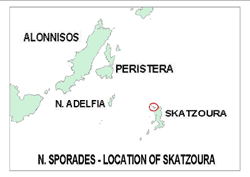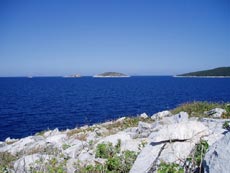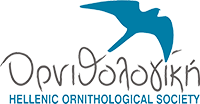 In the spring 2005, started a project for the eradication of rats from 3 small islets, Kasidis, Lachanou and Polemika near Skantzoura in the National Marine Park of Northern Sporades (see map and picture of the island complex). This was the first project of its kind in Greece. It was a part of the conservation measures, taken for the purpose of protection of Eleonora’s Falcon (Falco eleonorae), which breeds on one of the islets, namely Lachanou.
In the spring 2005, started a project for the eradication of rats from 3 small islets, Kasidis, Lachanou and Polemika near Skantzoura in the National Marine Park of Northern Sporades (see map and picture of the island complex). This was the first project of its kind in Greece. It was a part of the conservation measures, taken for the purpose of protection of Eleonora’s Falcon (Falco eleonorae), which breeds on one of the islets, namely Lachanou.
Rats are a well known predator of nesting birds and are one of the worst invasive alien species worldwide. They have caused or contributed to the extinction of numerous endemic avian species and threaten many more. Their most disastrous effect is on isolated islands where they prey on the nesting seabirds unrestrictedly, while there are no predators which would control the size of rat populations.
Among bird species which nest in the Aegean area, those which are among others exposed to rat predation are Manx Shearwater (Puffinus yelkouan) Cory’s shearwater (Calonectris diomedea), Black-headed gull (Larus ridibundus), Audouin’s gull (Larus audouinni), Shag (Phalacrocorax aristotelis), Peregrine Falcon (Falco peregrinus) and finally Eleonora’s Falcon as well.
In the case of Eleonora’s Falcon, rats prey mainly on their eggs and nestling and may reduce their breeding success by up to 25%. Therefore eliminating the threat of rats is one on the key measures for the conservation of Eleonora’s Falcon and consequentially other nesting bird species as well.
 The technique using rodenticides to eradicate rats is well known and has been widely used in the last two decades all over the world for the restoration of ecological balance on islands. In our case, the knowledge, expert guidance and funding were provided by The Royal Society for the Protection of Birds and implemented within the framework of the project “Conservation measures for Falco eleonorae in Greece”.
The technique using rodenticides to eradicate rats is well known and has been widely used in the last two decades all over the world for the restoration of ecological balance on islands. In our case, the knowledge, expert guidance and funding were provided by The Royal Society for the Protection of Birds and implemented within the framework of the project “Conservation measures for Falco eleonorae in Greece”.
The eradication took place on three mentioned islet, one of which, Lachanou, is known for hosting a breeding colony of Eleonora’s Falcon. The other two nearby islets, Kasidis and Polemika, had to be cleared of rats in order to prevent their reinvasion of Lachanou. The period of eradication was chosen to be early spring, when there are fewer bird species present in the area, to avoid their disturbance. The baiting was performed in late March 2005, followed by intense monitoring for the following three months.
Apart from establishing rat presence, the monitoring is focused on the entire ecology of the three islets, following the effects of the rat eradication on the ecology both flora and fauna of the islets. This monitoring will continue until the spring 2007, when the final results and success of the operation can be estimated.
The preliminary results show that rats have been eliminated from all three islets, without creating any negative impact on the ecosystem whatsoever. However, its long-term benefits may only be evident in the future in greater abundance and diversity of avian, as well as other animal and plant species.
Hopefully, the success of this rat eradication will only be a start of other similar conservation actions. It provides a perfect opportunity to acquire knowledge and means for the restoration of the larger groups of isolated island ecosystems, which are of such great importance for the birds and other species.



